“We spell it ‘Gay’, not ‘G’, okay? ‘Gay-M-O’,” jokes Aditya Surya Taruna (aka DJ Kasimyn) about the pronunciation of the initialism for the raucous speculative rave duo, otherwise known as Gabber Modus Operandi. Taruna and his band mate Ican Harem are bantering via video chat from their respective homes on opposite sides of the city of Denpasar in Bali. It’s the capital of the island in Indonesia’s Lesser Sunda Islands, famous for its tourists and especially popular amongst Australians. “We don’t feel at home anymore in the club. It’s somebody else’s house,” says Taruna, about his fraught relationship to the cultural life of a place that caters to its core industry, and the unlikely inspiration for what would become their debut LP Puxxximaxxx.
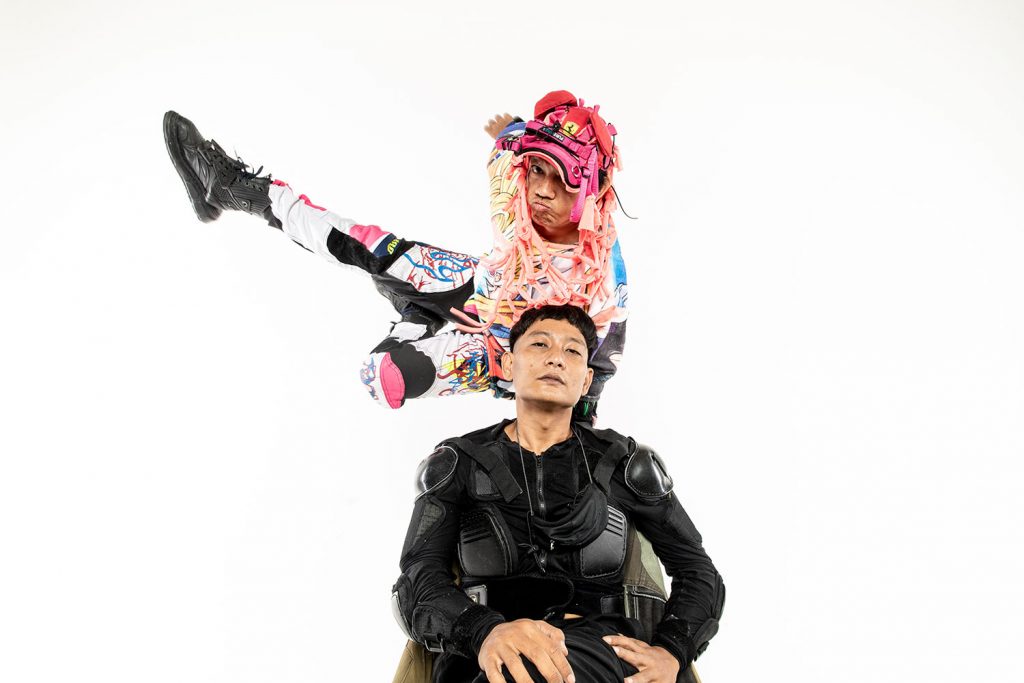
“That’s actually the point where me and Kas clicked,” adds Harem about how he and Taruna first started playing sets of Top 40 hits at 200 BPM for a rock audience. “In that gig, no one is playing electronic music, only us. Most of the bands, are just bands. Then when we play this kind of concept—where we put dubstep, house, and everything on really fast BPM—I saw all the punk kids get really excited, they get wild. Me and Kas, after the show, were like, ‘fuck, this works!’”
Remastered for reissue via Danse Noire on March 19—with a bonus track ‘Balap Liar’ premiering via AQNB today—Puxxximaxxx takes its irreverent title from a Sumatran insult that was GMO’s band name before it became the album. They’d played only a few gigs before Ican’s friend Wok the Rock (aka Woto Wibowo) in Yogyakarta heard a handful of songs, quickly asking the band to make more, so he could release them as a full-length on what happened to be his own iconic post-punk label Yes No Wave. The music is an infectious melange of gabber and hardcore; Indonesian funkot and dangdut, that’s applied to traditional gamelan pentatonic scales in a self-made style the band calls post-alay. It’s a positive reclamation of a much-maligned trend and internet slur. “The city kids start labelling kids from the suburbs who were dressing up in a western way—you know, bleaching their hair, emo hair—like ‘oh, alay’, which is really negative,” clarifies Harem.
Following that first initial stroke of luck with Yes No Wave, GMO’s exposure has only grown, going on to perform at Berlin’s CTM and Kampala’s Nyege Nyege Festival, while also touring China courtesy of Asian Dope Boys and Shanghai label SVBKVLT in 2019. This year, Gabber Modus Operandi return to where it all started with Puxxximaxxx, alongside a merch collaboration of Bali-made sandals advancing Harem’s own interest in exploring his Indonesian identity through recycled fashion. “Because everything we get is ‘tourism rave’, it’s Western rave, and we just kept thinking, ‘what is our rave, what is our trend?’” explains Harem. “The way we also dress, the way we also perform; answering this question from our point of view is the kind of thing we want to always push forward with the album.”
**This cosmopolitan approach to music and art is something that I find really attractive about what you guys are doing.
Aditya Surya Taruna: Yeah, well, music is a kind of privilege here. Indonesia is so vast, so there’s no one radio station or TV that influences you, feeding you music. To grow up in thousands of islands, it’s so saturated, our musical influence. I think it’s the same with Ican, when we were teenagers most of the influences came from the people that study in Jakarta, in the big city. I remember in the late 90s, older kids telling the story, ‘Oh, you should listen to Soundgarden, it’s so underground’, and actually I found out that Soundgarden is not that underground [laughs].
**Which one of you was in a rock band?
AST: I was in the band.
Ican Harem: Kas was the singer of the rock band. Its name is like… United by Haircuts. I used to be a big fan of Kas’ band. I didn’t even know Kas was the singer, but I knew the work. Back in early 2006, I liked that band, the inspiration, what’s it called?
AST: The International (Noise) Conspiracy.
IH: The International (Noise) Conspiracy! That’s the sound of Kas’ rock band in 2006.
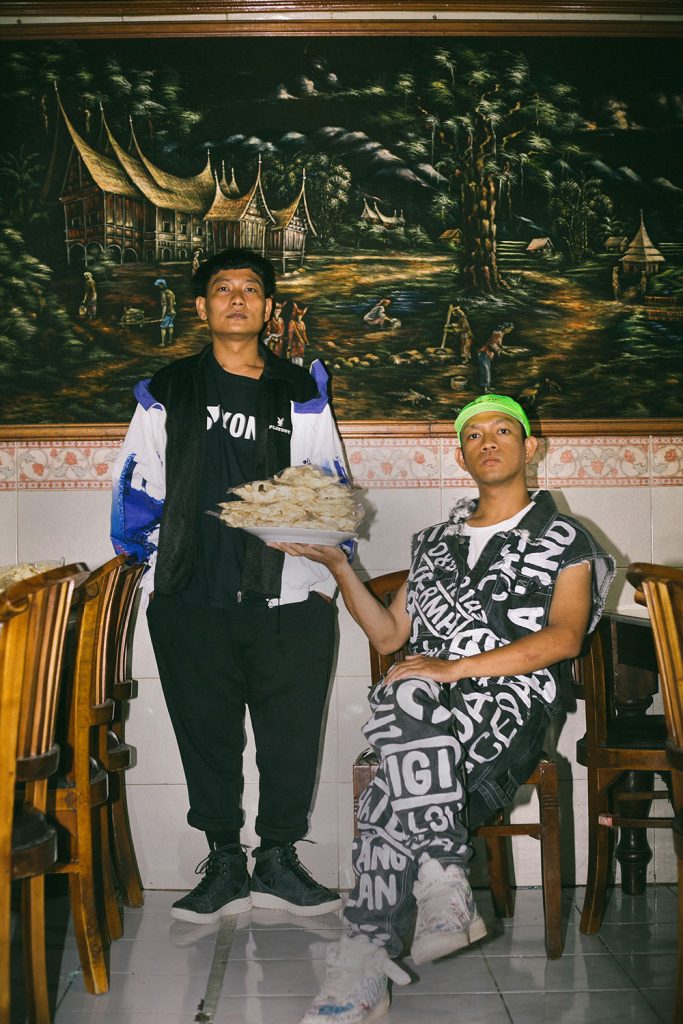
**I remember in like 2006—when Wolfmother was big—there was that Indonesian band called The S.I.G.I.T.
AST: Yeah, I was starting that same time with The S.I.G.I.T because I remember they came to my uni to bring their own printed CD. You know, back then you still had a demo. You’re like, ‘hey dude, this is our demo’ and then when we go to Bandung, we’ll bring that. But that’s also what we talk about, with privilege. I think it’s like Australia, the distance between Brisbane to Melbourne is quite far, right?
**Well, Perth where I come from to Melbourne is six hours by plane.
AST: Exactly. Here it’s kind of concentrated between Jakarta, Bandung and Jogja [Yogyakarta]. Ican studied in Jogja, I studied in Jakarta and we’d sometimes hang out in Bandung. That’s the distance of the underground music trade. Both of us were just continuing the older people that were influencing us with the music. Back then it was like CD, and the medium to listen to music was really small, and then internet was not there. I don’t know if it’s connected but that’s the point of how our musical influence is a bit messy and then take whatever we can.
**What I find interesting about you is that there’s obviously this really conscientious focus on being post-colonial but its hard to erase its influence, and you also talk about being in this middle ground between the East and the West.
AST: I think that’s the thing, both of us are taking this privilege as a big challenge. In the end, the first wave of the Indie explosion in early-2000, like any other place in the world, you just make the first wave of copying everything, including me, including Ican. We were just like, ‘okay, we have a platform again. Especially in Jakarta, there was a big change with the 1998 riots. That’s when the dictator went down [Suharto] and it’s kind of like an opening of the political and ideological because, back then everything was censored, for 35 years. It worked in a really systemic way that people didn’t know they got censored.
After that, people were amazed by how crazy we could go under the tyrant, and then there is a wave of these first indie bands. It’s beautiful but also so many of us are still doing a lot of copying of stuff. Of course, you will have Rolling Stones and Beatles covers—bands are going to write stuff like them—but slowly it moves into a different territory and questioning a lot until we found Senyawa, this experimental band. For me personally, there is no GMO, if there is no Senyawa because it’s showing us how you could enjoy being Indonesian.
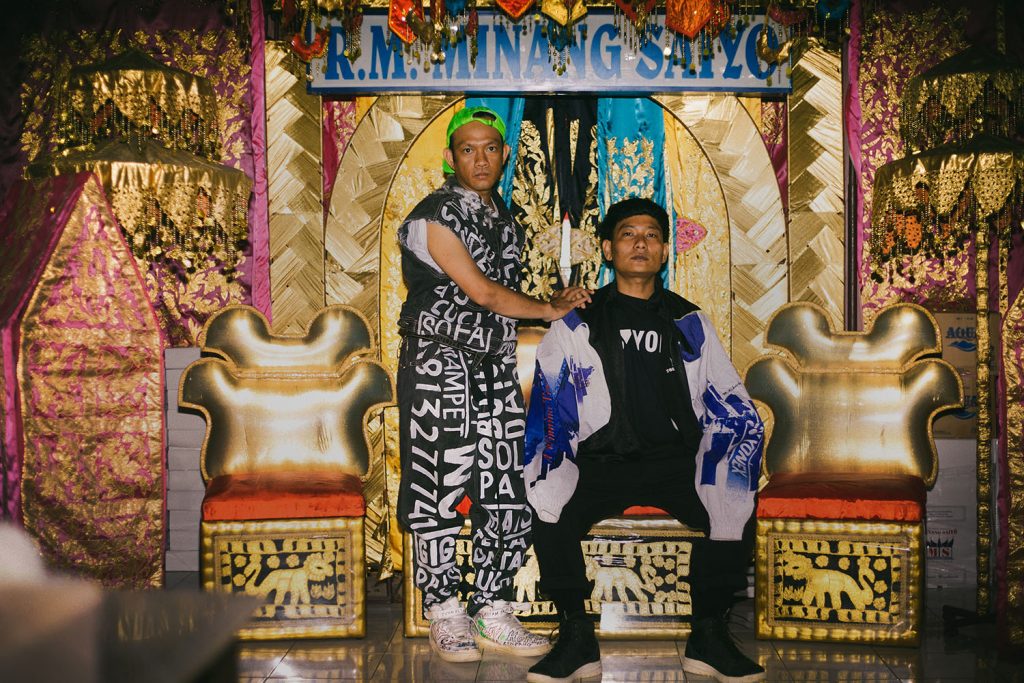
**What privilege do you mean, the privilege that you have exposure, or that you had other privileges that meant you could make music how you make it?
Kas: Both. We are in the middle class, and we are aware that we are not the people that come from the grassroots, rather that we grew up in the university. We grew up in the young chamber of people that discuss and stuff. That’s our privilege. And music-wise, both of us with the college circle, the friendship, we kind of make music with the medium that we only have because Gabber Modus Operandi don’t produce with really fancy stuff. If people think about electronic music, mostly people think about expensive hardware and it’s so expensive here. It’s even more expensive than in Australia to buy like a proper studio and synthesizer. It’s basically, whatever we could. That’s the privilege.
Ican: As Indonesians living like us, like what Kas said before, we are really subculture kids learning everything from the internet, getting all the information of what is cool, what is not, and are really active in this. That’s actually bridging as to become this kind of identity, like love club music. Whenever you’re living in Bali, surrounded by this tourist activity, and whenever it’s become a club, you always see this tourism pleasure. That’s the click between me and Kas, we always have this perspective of, ‘why is the music always serving tourism, why is every club only presenting overseas DJs, rather than local DJs, where there’s actually equal knowledge in there, why is the music always for serving, and serving, and serving, never talking about another idea.
**You mentioned this new wave that happened after the 1998 riots, but you also talked about the 2014 election and that it had some kind of impact on the internet, what were these two movements that affected culture?
Kas: Well, first we tore down the tyrant in 1998, and then suddenly a lot of influences were coming in. That’s before the internet but people can play mostly whatever they want, that before they shouldn’t. Then we have this new president, who is actually also an asshole in the end, but we have the internet. I think subconsciously we see the USA and Obama that can make the first ‘internet election’—with the Shepard Fairey logo, the famous ‘Hope’ poster and stuff like that—so we have the second in 2014 that really makes the internet a political tool. We have 10,000 islands, so it’s hard to distribute political ideas or educate people. But that’s actually not the point of what makes GMO. I think the point is when it happens in 2014, the Chinese fake smartphone phone is happening [laughs], 4G is happening so we’re focusing more on how technology is also distributed and accessible to the middle class, that they could become the producer of content.
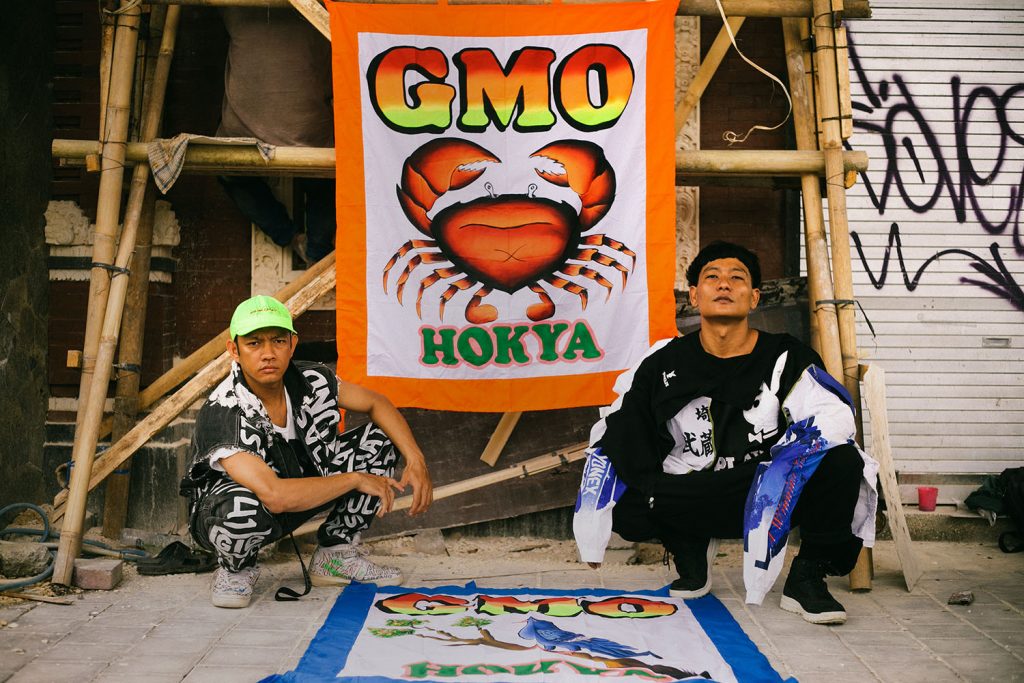
**You release Puxxximaxxx in 2018, and there’s this kind of cultural revival that happens in 2014, is that the point where your musical direction changes?
AST: We don’t really know that it should be released anyway. It’s just a really fun project, it’s almost a nihilistic project, back then—because with Ican doing the performance, and singing, and explaining the idea of ‘post-alay’—I’m falling in love with the concept. For me, I have this idea of futurism. I’m so bored with music in that time that I just want to make something futuristic, even if it’s shit. It’s just like, ‘I want to see the future of the music around me’. Puxxximaxxx is basically, imaginary rave, imaginary hardcore that never existed. It’s full of imagination.
IH: It’s because there is no gabber scene in Denpasar. Even when we call it ‘hardcore’, for people here it’s connecting with this kind of New Yorker’s hardcore. Then Puxxximaxxx itself is kind of like a statement of our being bored with this tourism club music, or tourism electronic music. We are living in the subculture but, in a way, we’re still surrounded by this identity of, ‘what is Indonesian subculture, and this imagination of what is the future of rave?’
**You deliberately don’t offer English translations of your Indonesian titles to oblige a Western audience, but I went through and Google translated everything…
AST: It’s good that it makes you make the effort for you to understand us, rather than us serving you guys. It’s huge because both of us love to go to watch this dangdut traditional party, and consciously we’re just like, ‘wow, these people are way more fun than the underground kids’.
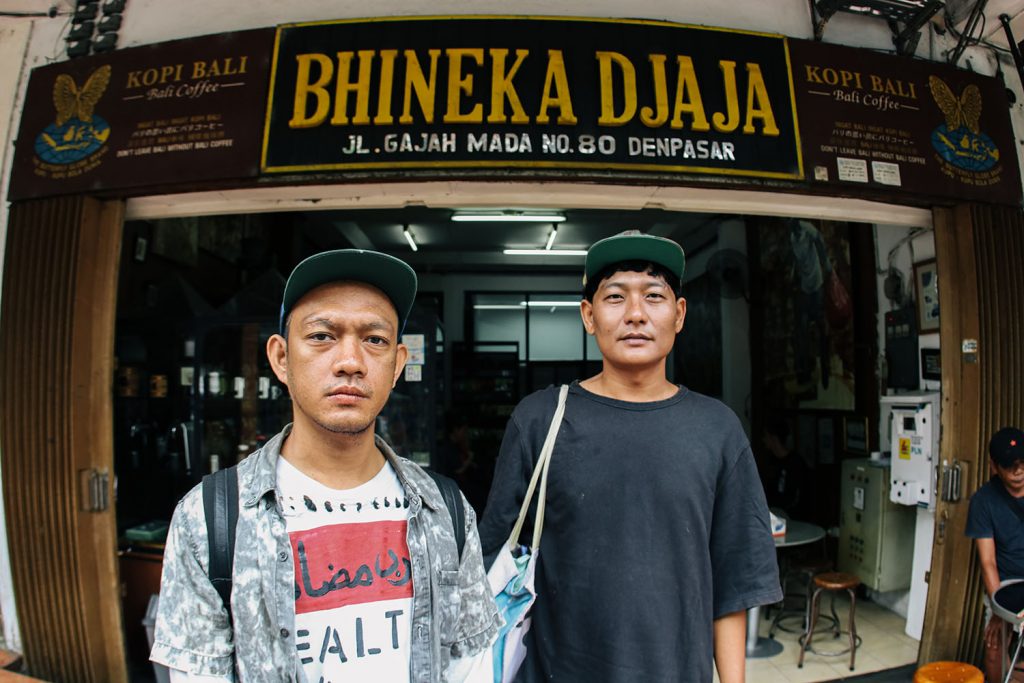
**Dangdut is also interesting because it’s partly influenced by Hindustani and Arabic, as well as local folk music. Obviously, no culture exists in a vacuum, and it can be so rich and nuanced while still being touched by colonialism, do you think about that exchange in relation to the music you make and listen to?
AST: Our confirmation is coming when we go to Nyege Nyege [festival], you know? It’s a completely different world in Asia than in Africa. The main problem of Asia, I think, is we don’t have the balls to claim it. There is so much good music in Asia, but we don’t have the balls at least to say the name of this music, or what’s the dance name. In the past 20 years of culture…
IH: I think we’ve got that kind of statement of the name of the genre or the sound, like funkot.
AST: Yeah, but funkot is not working internationally, because the inferiority is still high, people don’t really celebrate it. I think it’s kind of different when you see in South Africa with the gqom music, or like singeli from Tanzania. I love the idea in Africa, when we go there and see with our own eyes, how we are in the same situation, we’ve got colonisation, we try to keep up with things and stuff. I’m not sure why, but they have more celebration there. They just have the balls to be like, ‘Oh, this is this, you should name it this, and this is the dance.’ There is a big self-confidence there.
**You mean pride?
AST: I don’t think it’s pride. Sometimes pride goes the wrong way that it becomes delusional. It’s more like enjoying your identity.
We really want to treat GMO in a proper way that’s not parodical, we don’t want to make it parody. Some people think it’s parody but if they see us live, they know it’s not parody. It might be sarcasm, it might be irony, but we really want to crush this idea of this colonial, boring music, or this globalization. That’s why I like stupid things. Me and Ican, we agree that we only write music titles in Indonesian because for Indonesians, it’s also, ‘you need to make the title in English, so people understand’. Fuck it, fuck that. We’re going to make it in our language.**













